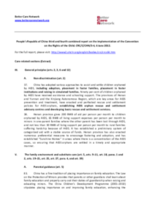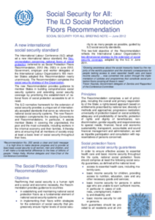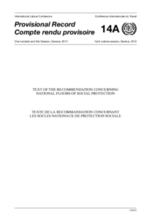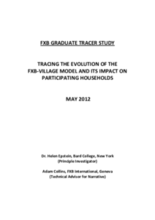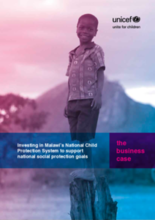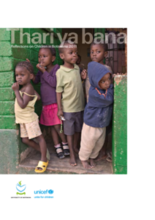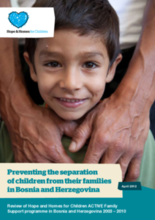Displaying 281 - 290 of 454
The People’s Republic of China issued its third and fourth combined report on the implementation of the Convention on the Rights of the Child in June 2012. This extract of the report focuses on sections relevant to children's care and in particular those addressing Family Environment and Alternative Care
This International Labour Organization (ILO) brief introduces a new international standard adopted in June 2012, the Social Protection Floors Recommendation, 2012 (No. 202), that provides guidance to member States in building comprehensive social security systems and extending social security coverage by prioritizing the establishment of national floors of social protection accessible to all in need.
This International Labour Organization (ILO) document introduces a new international standard adopted in June 2012, the Social Protection Floors Recommendation, 2012 (No. 202), that provides guidance to member States in building comprehensive social security systems and extending social security coverage by prioritizing the establishment of national floors of social protection accessible to all in need.
Study tracing impact of FXB International's community-driven “FXB-Village” model on graduates of the program. The models is a structured program of household support and economic strengthening designed to empower particularly vulnerable families to escape extreme poverty and ensure the enduring wellbeing of the children in their care.
On May 2, 2012, in preparation of the Family Strengthening and Alternative Care Conference for Francophone Sub-Saharan Africa in Dakar, Senegal, BCN and the regional planning committee convened experts and practitioners to present and discuss the efforts to implement the Guidelines for the Alternative Care in the region. Watch this video for presentations, country level experience from Togo, and discussions on the pressing issues facing implementation in the region.
The paper argues that investing in Malawi’s emerging national child protection system will support national social protection goals. The Government is bringing together its various responses to child protection and orphans and vulnerable children as the foundation on which to build the national child protection system, with the intention of delivering a coordinated, harmonised and systematic approach to protecting children from violence, abuse, exploitation and neglect.
Collection of research and reflections on children’s issues in Botswana articles in the various chapters of the publication have been structured to follow the life cycle of the child as she or he grows and is faced with different issues that need to be addressed: young child survival; child development; child protection; HIV and AIDS; and child-sensitive social protection.
The Fifth Annual Report to Congress on Public Law 109-95, The Assistance for Orphans and Other Vulnerable Children in Developing Countries Act of 2005 highlights continued efforts made by the U.S. Government to improve coordination on behalf of vulnerable children in the past year.
This paper presents UNICEF's Social Protection Strategic Framework, which was developed to respond to the emerging global challenges and increased demand for policy and guidance on social protection.
Hope and Homes for Children has been implementing ACTIVE Family Support in Sarajevo Canton in BiH since 2003. The program consists of two elements: the prevention of separation of children from their parents as the primary focus, and the reintegration of separated children from institutions back into their biological families. This unique and holistic program is tailored to the individual needs of each child and family and it is built on the following core values: partnership, respect, inclusion, sustainability and the best interest of the child.

